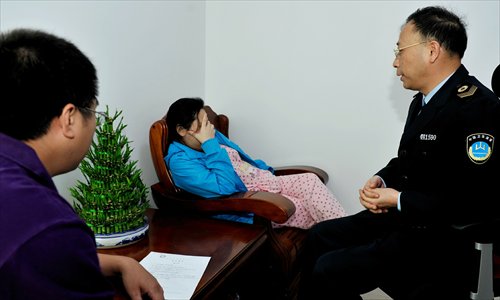HOME >> CHINA
Black market births
By Kou Jie Source:Global Times Published: 2016-4-24 20:13:01
Regulation loophole creates thriving surrogacy market

Shenzhen police talk with one of the five surrogates they arrested in March 2013. Photo: CFP
"Surrogate pregnancy has helped many infertile couples achieve their dream of having babies, and you can get rid of your childless life with our best services," read a slogan on a Guangdong Province-based surrogacy agency's website.
Such tantalizing slogans are commonly seen in advertisements for surrogacy businesses. An online search for private clinics in China offering surrogacy services yields dozens of results, showing the popularity of this shady, underground business.
Surrogacy procedures are not allowed in medical institutions in China. But a combination of the country's two-child policy and the large amount of infertile couples has encouraged would-be parents and surrogates to circumvent medical institutes to perform the procedure themselves.
"The underground market in China shows that there is a need for surrogacy, which makes it hard for the government to completely ban it," Zhou Zijun, a professor at Peking University's School of Public Health, told the Global Times.
China's booming surrogacy black market produces more than 10,000 births a year, the Xinhua News Agency reported.
Booming market
"I'm not sure if it's illegal or not to be a surrogate, but my company has been providing such services for years, and business is booming," a staff member who only gave her family name as Yang from the Guangzhou-based Tianfu surrogate agency, told the Global Times.
"Most of my clients are infertile couples, and we can perform a couple of surrogacy procedures for them every month," Yang said.
Statistics issued by the China Population Association in 2013 revealed that the infertile population of the country has surpassed 40 million, making up 12.5 percent of the total population who are of childbearing age.
According to Yang, there are two main types of surrogacy, one involves implementing clients' fertilized egg into a surrogate's womb, which costs 410,000 to 420,000 yuan ($64,596).
Clients can also get an egg from a donor first, and then put the fertilized egg into a surrogate's womb, which costs 50,000 to 60,000 more than the first method, Yang said.
"We have a pool of egg donors. Once you pay the money and sign the contract, you can meet them in person and choose the one you like," Yang said.
According to several surrogacy agencies reached by the Global Times, the procedures costs at least 400,000 yuan on average and is normally nonrefundable.
Clients can also choose the baby's gender if they pay an extra 250,000 yuan, Yang said.
"We have connections in the hospital, which can accept the couple's identity papers, legally registering the child as their own's," Yang said, refusing to reveal more details.
According to a New York Times report, China has more than 1,000 agencies like Tianfu.
Grey zone
Surrogate pregnancy is in a grey zone in China, as there is no law completely banning it, or regulating the market, which makes it hard to deal with issues related to the businesses, Zhou said.
Established in 2001 by the Ministry of Public Health, Management Measures of Human Auxiliary Reproduction Technology is a regulation that bans medical institutions and staff from performing any kind of surrogacy procedures. However, these rules simply pushed the business underground.
In March, 2015, the National Health and Family Planning Commission collaborated with 12 other departments to prevent surrogacy. From April to December 2015, the government initiated a special campaign against it - to little effect.
On December 27, 2015, a revised version of the Population and Family Planning Law was passed, which didn't include a controversial clause proposed in the draft that would have explicitly prohibited all kinds of surrogacy.
"Surrogacy is a challenging issue in many countries, currently, it's unlikely that China will make a specific law to regulate the market," Zhou said.
A surrogate from Central China's Hubei Province demanded 30,000 yuan as compensation after suffering a miscarriage, but her request was denied by the clients and the surrogacy agency, as there is no specific law that can solve such disputes or which lays out the responsibilities of the various parties involved, Xinhua reported.
"Surrogacy is not only about fertility, there are series of ethnical, societal, legal and economic problems coming after it, which should be better regulated," Li Yinhe, sexiologist, told the Global Times.
Posted in: Society